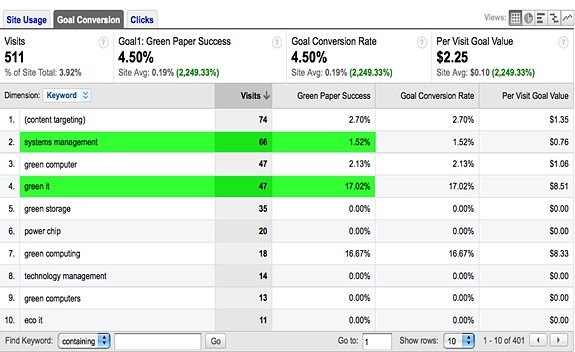One of the most dangerous trends emerging is that B2B marketers, and their extended search- marketing resources, are regularly making bad decisions based on "solid analytics data."
Because as a consultant I work with various companies, I learn certain lessons much more quickly than, say, someone who is working only within his or her company and is therefore not privy to the same variety of information and experiences.
And I'm finding that all too often marketers are deciding to spend either more or less money based solely on the conversion rate of how a certain search phrase, ad creative, or banner ad performs: in other words, the percentage of people who visited the site and requested a whitepaper, a demo, etc.
While conversion rate, in the context of an analytics report, is one way to measure the effectiveness a search phrase, it can be extremely misleading.
For an example, let's take two search phrases from the same campaign: "Green IT" vs. "Systems Management."
You can see in the following screenshot that...
- "Systems Management" delivered 66 visitors, and 1.52% of them converted to a whitepaper.
- "Green IT" delivered 47 visitors, and 17.02% converted to a whitepaper.
The "Green IT" phrase is the hands down winner, right? Well, maybe not!

No one could blame the marketer running this search campaign for immediately pausing "Systems Management" and rerouting those dollars to buy more "Green IT" traffic. Doing so certainly would fall within the realm and responsibility of a good search-engine marketer—if this were all the data available. But you know better...
By now it's become common for most marketing departments to focus not just on the quantity of conversions but also on the quality of those conversions. A good Internet marketing system or analytics package like Google Analytics will tie the Web lead back to a specific search term in the pay-per-click campaign. This qualitative feedback helps search marketers make wiser decisions.
Surprisingly, however, one of the easiest pieces of data to capture that helps provide an even better picture of actual search-term value is often overlooked and rarely mentioned. I'm referring to the organizations themselves that arrived to the Web site but didn't convert. Or, in plain English: "Merck (for example) came to our site for the term 'Technology Management' and didn't fill out any forms, but we still know they were here!"
Refer to the screenshot above again and note the 14 visitors for "Technology Management" none of which converted. Is this phrase a stinker? Should we pause it? Not if Merck is on your wish list of companies! In fact, this phrase may be 10 times more valuable than all of those "Green IT" so-called conversions combined.
And remember those 65 visitors for Systems Management only 1.52% of which converted? Well, in that other 98% that didn't convert is a measurable number of legitimate and attractive prospects who were brought to your Web site, exposed to your value proposition, and even visited several pages.
Enterprise B2B, Pay Close Attention...
...because this really affects you, as clicks and search traffic can be very costly and the number of visitors you get to analyze is very limited.
If you are spending thousands of dollars per month on search marketing and not capturing visiting organizations (both those that convert and the many more that don't), you are shutting down phrases and scaling back campaigns by using only half the truth. Equally as dangerous, you are likely routing dollars toward phrases and ad creative that appear to perform better but in reality are merely clogging the marketing database and sales pipeline.
If you are hoping to just "test the waters" to judge whether search marketing is a success or failure based solely on conversions, you will likely get scared off and prematurely end what might otherwise be a very effective lead-generation weapon.
It's much better to figure out what types of companies you can fetch for various phrases as fast as you can and optimize media spend based on a mix of visiting organizations, conversions, and qualified leads.
In the examples used in this article, we are looking at a campaign in its infancy; yet it has taken nearly 45 days just to collect this much data. Obviously, you'd like as much data as possible to make actionable, intelligent decisions.
For a lot of enterprise B2B companies, unless you have tens of thousands of dollars to throw at search a month, your data will be coming in slow and true leads will be very few and far between. It's imperative that you be able to get some visibility as to what types of companies you are bringing in through search.
There's Really No Excuse
Capturing the visiting organization and tying it to a specific search term is not hard to do from a technology perspective; there are several off the shelf solutions that can do it. Two services I use regularly for my clients are LeadLander and Pardot. I've also heard good things about Netfactor.
If you are in charge of ROI for search marketing dollars, you should probably make sure you are collecting and using this data. If you are not, be a good steward and pause your media spend until you can get this missing valuable piece of additional data. You can be set up in just a couple of hours and be back in business quickly.
Take-Away Points
- Make sure you're capturing and reporting on visiting organizations referred by specific search phrases.
- Factor in the number of legitimate organizations you've captured when assessing the effectiveness of your search terms and campaigns.
- Don't fall into the trap of optimizing campaigns based solely on quantitative conversion data.
Taking a broader view of how valuable your search traffic is will help you make wiser decisions and help you achieve greater success with your campaigns.



